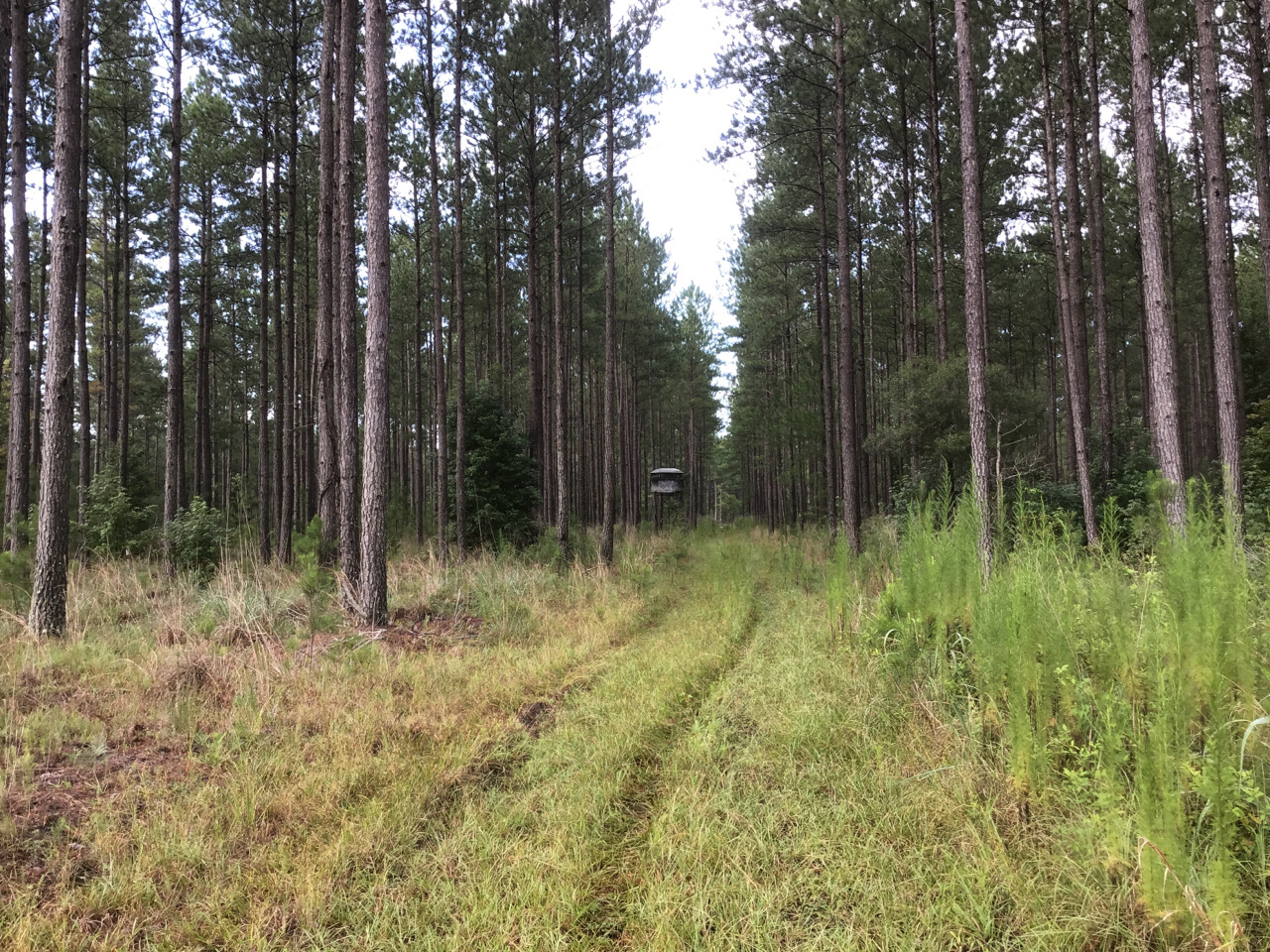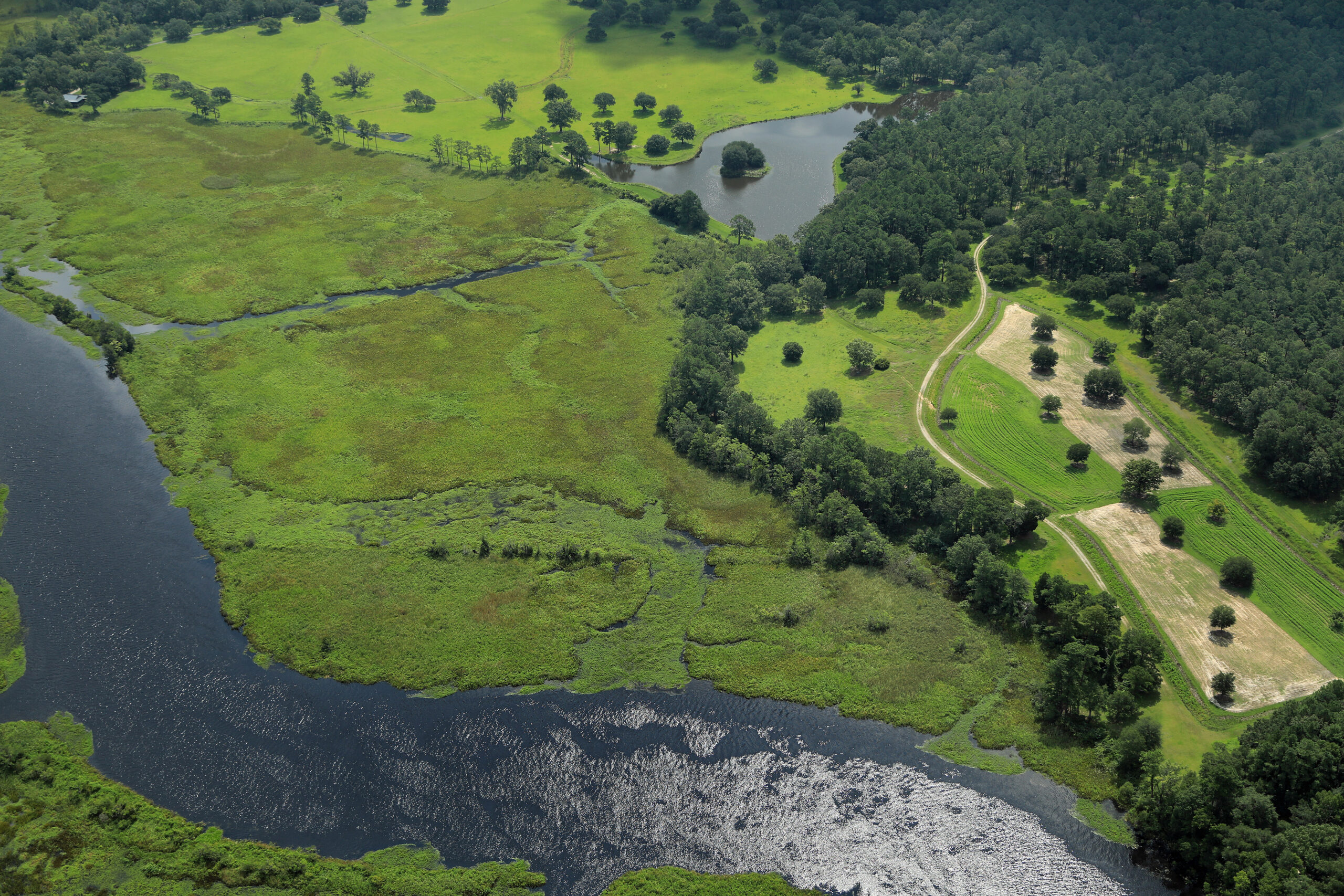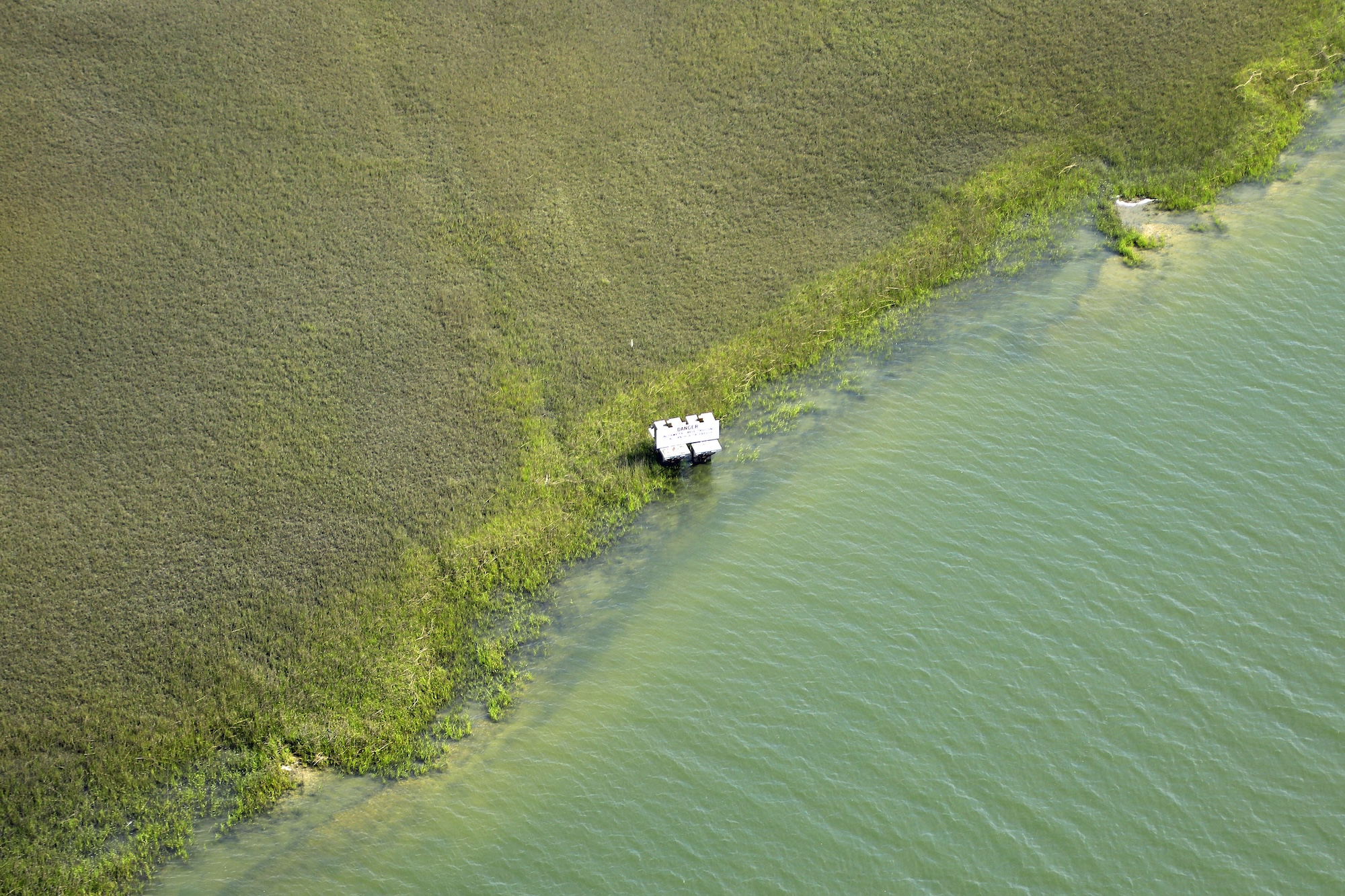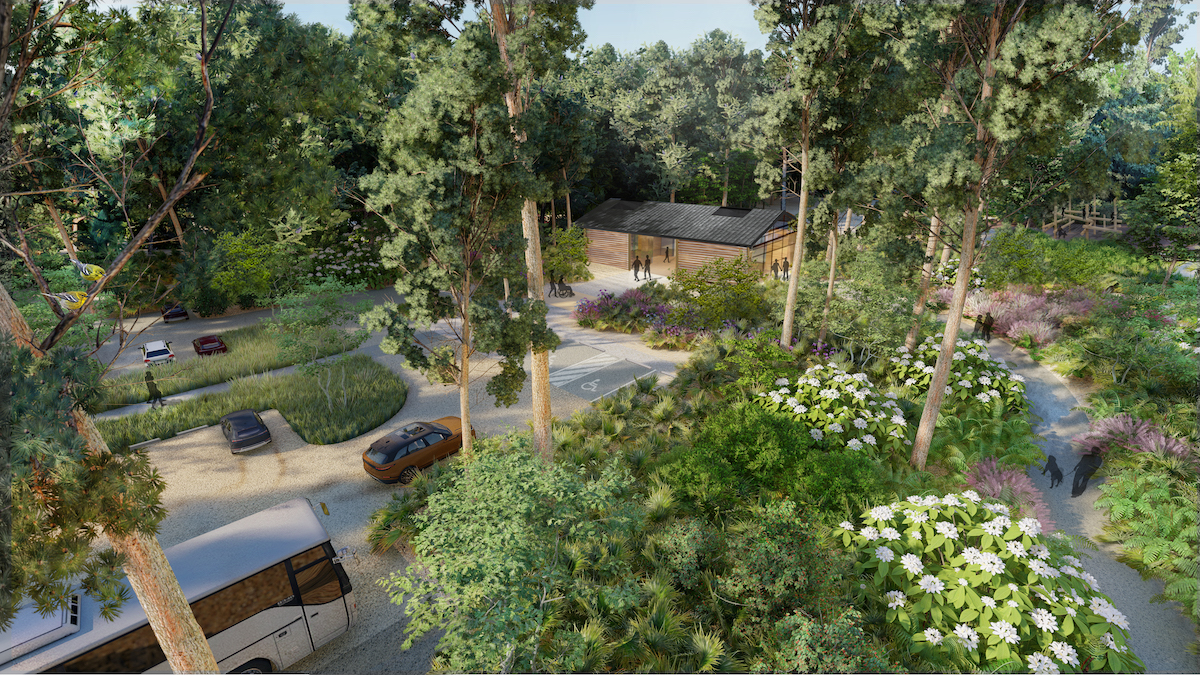Johns and Wadmalaw Islands within the Lowcountry’s Sea Islands region form a flagship landscape for Lowcountry Land Trust. These islands represent a rural, traditional way of life under the pressure of sprawling development and associated infrastructure. Over 39% of all Johns and Wadmalaw Islands property is currently protected, offering public benefit through recreational opportunities, agricultural use, flood abatement, water quality preservation, and scenic frontage along roads, rivers, and creeks. Lowcountry Land Trust, along with many community partners, is dedicated to conserving critical land on Johns and Wadmalaw Islands to maintain all of these public benefits.
Over the past several years, Lowcountry Land Trust and community partners have meaningfully engaged longtime and new residents in identifying places to protect on these islands, and we are actively implementing that vision. Lowcountry Land Trust protects 86 properties totaling 9,903 acres across Johns and Wadmalaw Islands, adding three more to its portfolio last year. In 2023, Lowcountry Land Trust is actively pursuing opportunities to conserve additional acreage within the Sea Islands to continue reinforcing the Urban Growth Boundary as a protective barrier between the fast-growing urban center and this vital community landscape.
Keep reading to learn more about Johns and Wadmalaw Islands properties that Lowcountry Land Trust, in partnership with landowners and community partners, protected in 2022.
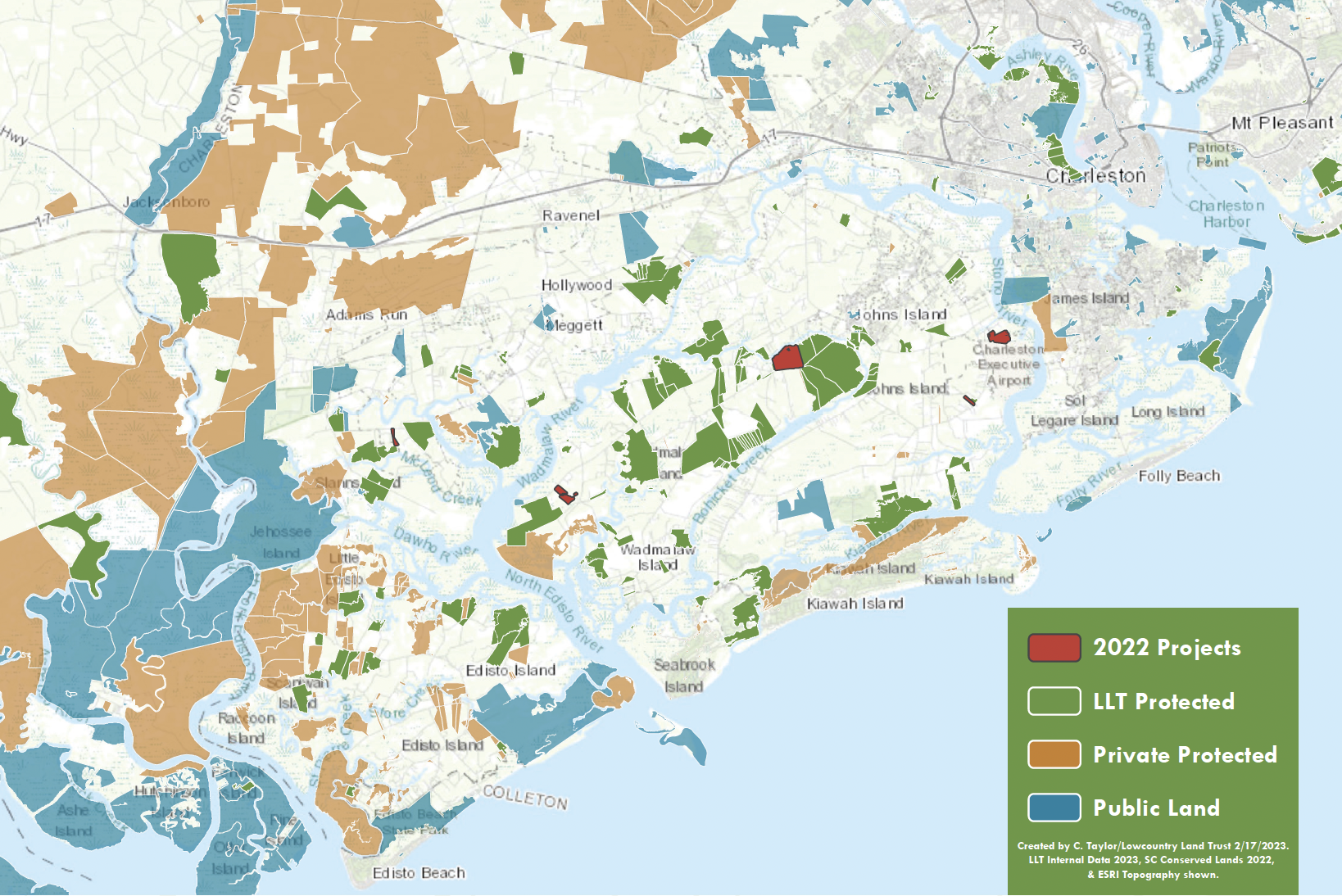
Angel Oak Preserve: Community engagement efforts for Angel Oak Preserve have been ongoing since 2013 and gained new momentum after the selection of award-winning landscape architects Nelson Byrd Woltz to lead a comprehensive planning process for the much-anticipated project. In January 2023, Lowcountry Land Trust announced that the near-final designs of the future Angel Oak Preserve were ready for community members to review and provide feedback. Unrivaled in its features and accessibility, the 44-acre preserve design features boardwalk trails, a nature play area for children, and educational information about the tree and native people that have held the Angel Oak sacred. Charleston residents celebrate the magnetic draw of the enormous, centuries-old tree in the heart of Johns Island – and Lowcountry Land Trust is working to highlight this beloved local landmark symbolizing history, honor, and hope. Building on nearly ten years of community outreach, the Preserve will be a publicly accessible green space that conserves and enhances the Angel Oak’s integrity and surrounding ecosystem; honors the rural and cultural context of the land; and provides a grounding, meaningful experience for all visitors. Lowcountry Land Trust is humbled and honored to have been trusted as the stewards of the forest that protects, shields, and sustains the Angel Oak. Lowcountry Land Trust is grateful for the support and leadership of the local community and particularly would like to thank South Carolina Representative Leon Stavrinakis for securing $3 million in foundational funding for the Angel Oak Preserve. The project’s total cost is expected to be $6 million, and fundraising efforts are underway.
Full Circle Farm: Lowcountry Land Trust permanently protected an additional 9.2-acre parcel at Full Circle Farm on Johns Island, donated by landowners Mary and Peter Conway in 2022. The original Full Circle Farm easement was donated by the Conways in 2017 and covers 12.48 acres on River Road. The new conservation easement brings the total protected acreage at Full Circle Farm to 21.68 acres, including about 865 feet of River Road frontage. It will help preserve Johns Island’s historic agricultural character, natural habitats, and water quality in perpetuity. The protection of Full Circle Farm is significant for several reasons. The property contains a diversity of natural habitats, including mixed upland forests, wetlands, active agricultural fields, pastures, and open areas, all of which can support a variety of floral and faunal species as well as local agricultural and equestrian uses. Full Circle Farm is less than a quarter-mile from Hut Creek and its associated wetland tributary system, which drains directly into the Stono River, making it a crucial location for enhancing water quality and providing critical floodwater storage and filtration. The farm is adjacent to River Road and is prominently visible to the public, contributing to the sea island’s scenic, natural, and rural character. The property has been traditionally managed for agricultural and rural residential uses. It is currently operated as a working farm that also features undisturbed forested wetlands, benefiting both wildlife and the local economy. We are thrilled to include the additional Full Circle Farm conservation easement in our portfolio of protected lands. We hope this easement encourages the protection of other lands that, together, will strengthen Charleston’s urban growth boundary and ensure that the natural and agricultural character of Johns Island is preserved for generations to come.
Oak Bar: Lowcountry Land Trust’s protection work returned to Wadmalaw Island in 2022, thanks to the generosity of Oak Bar landowner Steve Brantley. Carrying forward work that has protected 31% of Wadmalaw with conservation easements since 1989, the 60-acre Oak Bar property is LLT’s 61st project on the island. Steve Brantley epitomizes the love for the land that motivates so many Lowcountry landowners to donate conservation easements. Among the many ways he has used the land include hunting, farming, cultivating a broad and beautiful array of camellia varieties, and convening friends under a gorgeous live oak to enjoy the company of each other as a parade of wildlife grace the nearby fields. The property has a unique blend of habitats, including a freshwater pond, freshwater wetlands, and salt marsh, all of which provide critical floodwater abatement and filter pollution, downstream water quality in Leadenwah Creek and the North Edisto River. Properties like Oak Bar and landowners like Steve Brantley are what make Wadmalaw Island such a unique and special place–both now and for generations to come.
Oakville-Burden Creek: In November, Lowcountry Land Trust announced the permanent protection of a 90-acre site once threatened by development in the heart of Johns Island. The conservation easement comes after years of collaboration through the Johns Island Community Conservation Initiative, a partnership of The Center for Heirs’ Property Preservation, Coastal Conservation League, Open Space Institute, and Lowcountry Land Trust. Positioned at the mouth of Burden Creek, only a few feet above sea level, and sitting along Charleston’s Urban Growth Boundary adjacent to the Charleston Executive Airport, Oakville-Burden Creek’s 90 acres were once marked for development. Despite extensive discussion about the perils of developing flood-prone areas and vocal community opposition, zoning laws allowed for the construction of over 200 houses on the property. In 2021, Charleston County Aviation Authority purchased the land and in 2022, Lowcountry Land Trust permanently protected the property with a conservation easement. Funding for the purchase of the conservation easement was provided by the South Carolina Conservation Bank and Charleston County Greenbelt Program. The protection of Oakville-Burden Creek represents the power of collaborative conservation and reinforces the integrity of Johns Island’s historical, natural, and rural heritage resources as development threats mount. A broad base of partnerships and relationships truly made this effort possible. The conservation easement comes at a critical moment as Johns Island’s agriculturally zoned farmland and forest properties, some close to Oakville-Burden Creek and the Urban Growth Boundary, are constantly threatened by development. Only the continued tireless work of Johns Islanders and local partners will prevent this cherished landscape from being lost.

